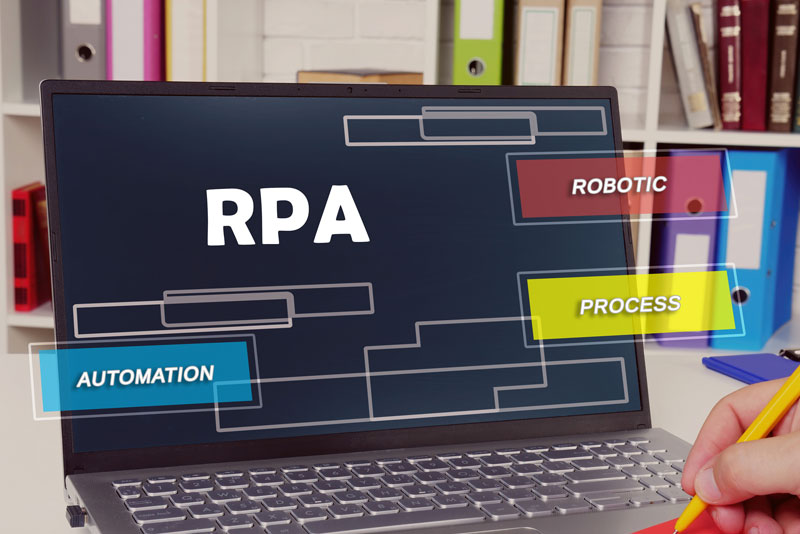With amazing technological advancements taking place all around the world, there have been significant changes in all industries and their business processes. The legal industry is no exception in this regard. Efficient data collection and management is vital to improve legal business processes and legal firms look forward to automate their data processing with the support of professional data entry services. Several smart technologies like artificial intelligence and robotic process automation are being increasingly implemented to improve efficiency and productivity in legal firms. Robotic Process Automation is gaining wide popularity in the legal industry of late as the technology enables law firms and legal departments to increase their productivity and serve their clients better.
Robotic Process Automation (RPA) as a technology has the capacity to considerably increase the efficiency of any business by reducing or even eliminating redundant and repetitive tasks. The sooner we jump on the bandwagon the better, as RPA can take away the burden of completing routine tasks and let one focus on more integral processes. RPA for legal firms holds great potential as it can save time that is spent on filing, paperwork, and other tedious tasks and help the lawyeokjibrts focus more on their cases.
What Is the Need for Robotic Process Automation in the Legal Industry?
In simple terms, robotic process automation (RPA) involves software that automates a business process. Without the actual presence of a robot, these involve software processes that copy the interaction between humans and machines and empower the business to configure the legal task that they want automated. It also avoids the probabilities of errors as it uses complicated and accurate algorithms to perform mundane, tedious tasks. In addition, it can manipulate data, offer responses, complete transactions and do anything that the algorithm asks it to do. The technology uses machine learning for data processing, easing the burden on employees who perform basic repetitive tasks, based on logic-based outcomes.
Several manual legal processes like drafting contracts, processing information, and making transactions are extremely time-consuming and have possibilities of errors. RPA can bring down the probability and cost of these errors that could negatively impact the reputation as well as the resources of a firm. Robots can reduce the burden of due diligence by looking for information in records; an employee will take hours whereas the bot can stop searching for information within minutes, saving a huge chunk of time.
When a law firm gets started with RPA, their efficiency is increased by digitization as more desirable effects can be attained with less financial and work-related effort. The cost and the value proportion of the bureaucratic and administrative processes – that are constitutional for the law sector – get considerably improved by using bots that perform data-intensive and repetitive tasks more effectively. As it doesn’t require any changes in legacy systems, RPA can deliver a high ROI within a short span of time.
RPA Benefits and Application Areas in Law Firms
Robotic process automation is mostly applicable to support functions and commoditized process-driven work. Here discussed are some common, specific areas where law firms can get started with RPA –
- E-discovery – Managing huge piles of data is a real challenge for lawyers. There are several e-discovery programs, but the costs are rather high, and law clerks must manually separate what is relevant. Even with software assistance, the process is time-consuming and process intensive. RPA’s capacity for flexible data management can be leveraged to simplify the process.
- Client Risk Assessment – Client risk assessment is another area that requires a lot of research and effort that can be made easier with the assistance of RPA. Automation processes can calculate case-to-cost data, find a client’s credit rating, search accounts payable and categorize them in risk registers and work out the opportunity cost of taking on a certain client. RPA can also use anti-money laundering (AML) and Counter-Terrorist Financing (CTF) risk assessment forms and gather the client’s details including their locations, services, and relationships and integrate the information into structured file information that can be easily retrieved. In short, building a complete profile will help save costs and resources.
- Fee Overruns Reductions – RPA can ensure much faster task finalization when clients decide to bring into play their own records system, and thereby troubleshoot communication issues. At-scale deployment makes robotic process automation an even better choice to handle this process. RPA scalability is a perfect choice for situations when vital legal documents from clients get delayed or when previous matters overrun too.
- Simple and Repetitive Tasks – Law firms hire paralegals to perform minor actions such as filing, recording, searching databases, An automated robot will free up the paralegal’s time by doing all the sludge work like creating spreadsheets, scanned documents, websites, tools, etc. Therefore, it opens up the employees to pay attention to the client’s needs and perform other strategic actions.
- Financial Management – The RPA software for legal teams can help with the processing of vendor invoices by drawing out data from different formats and feeding it into the financial planning system, thereby creating smooth payments. Generating bills from an existing management system will also help save labor costs.
- Compliance Checks – Compliance checks is another huge task that can be simplified by RPA in legal firms. It can help mitigate risks and also protect the firm from fines and other legal sanctions. Robots can perform due diligence and create suspicious activity reports to pull out potential risks. RPA can search and fill in the information and browse through to find dubious activities by clients.
The legal industry is preparing for a paradigm shift through effective implementation of RPA. RPA for legal teams has emerged as a boon, helping both the lawyers and their clients save a lot of time and money while also aiding their growth through increased proficiency. RPA adoption does not mean the end for legal jobs; rather, it will free human resources to focus more on value-based roles. With so many benefits and application areas, legal firms must consider RPA technology, along with data conversion for change. This can provide the edge over competition with reduced cost and improved efficiency. However, many legal firms still rely on manual processes. Back office outsourcing services provided by a professional BPO company could help handle routine back office tasks thereby reducing costs and enabling more focus on core competencies.




